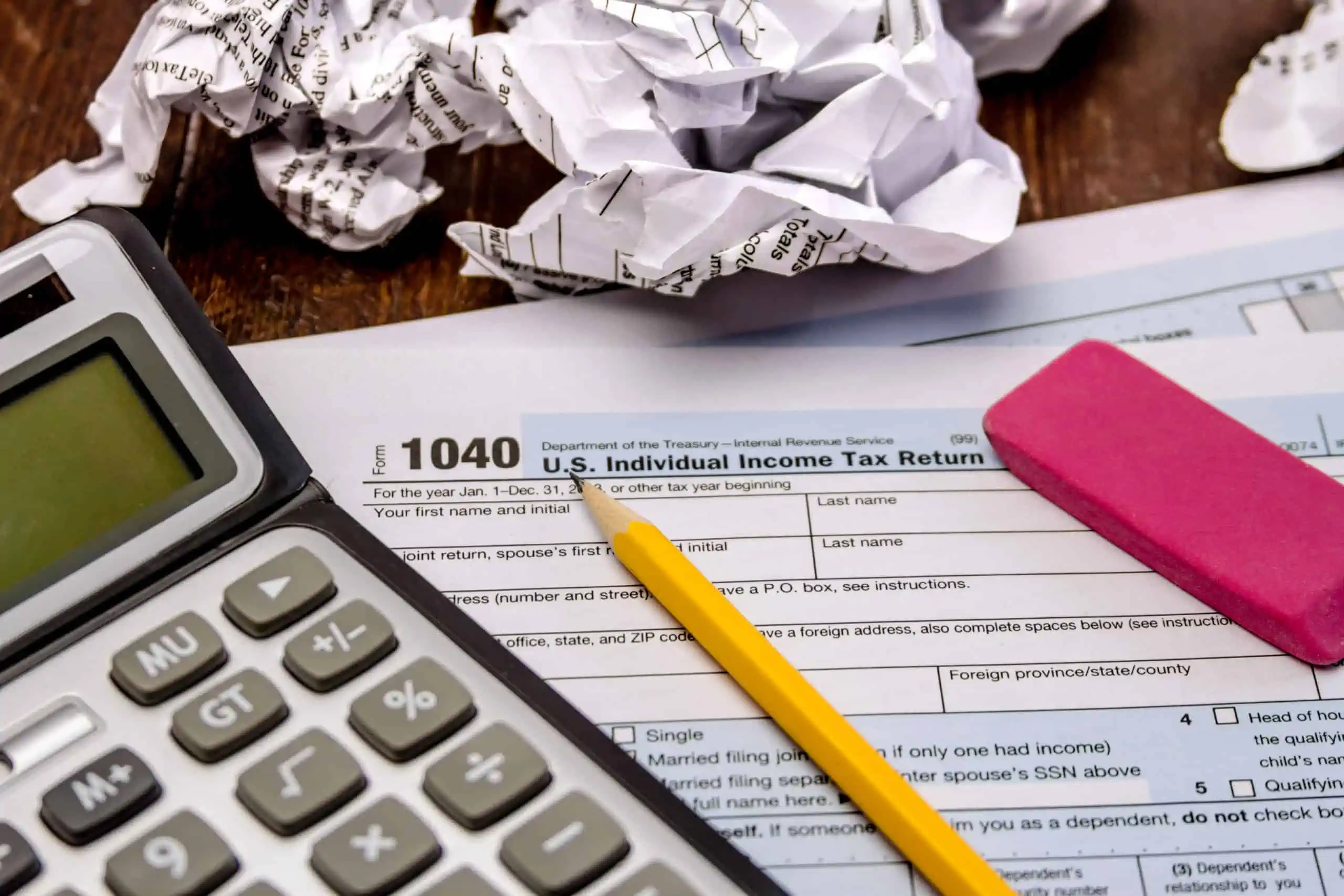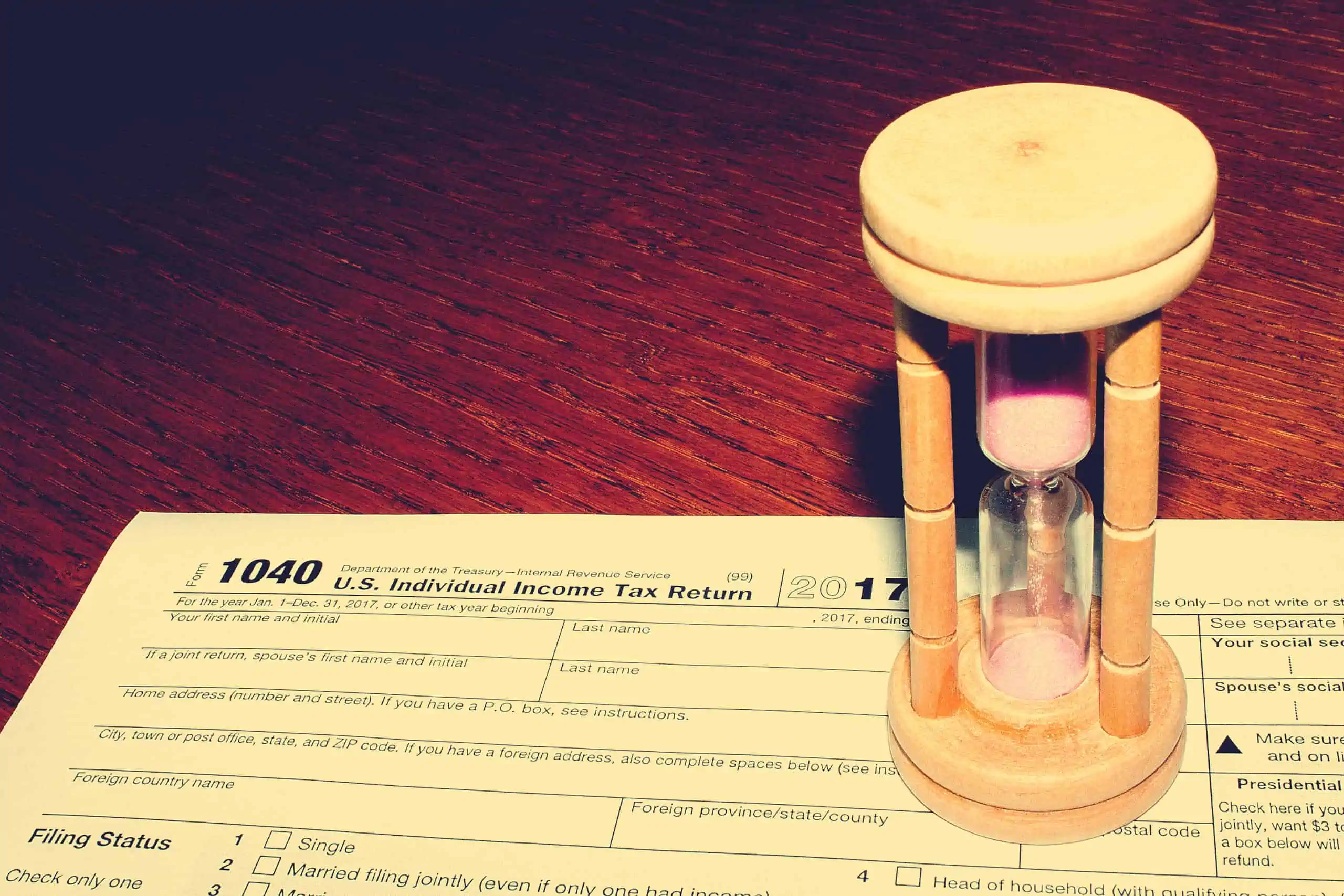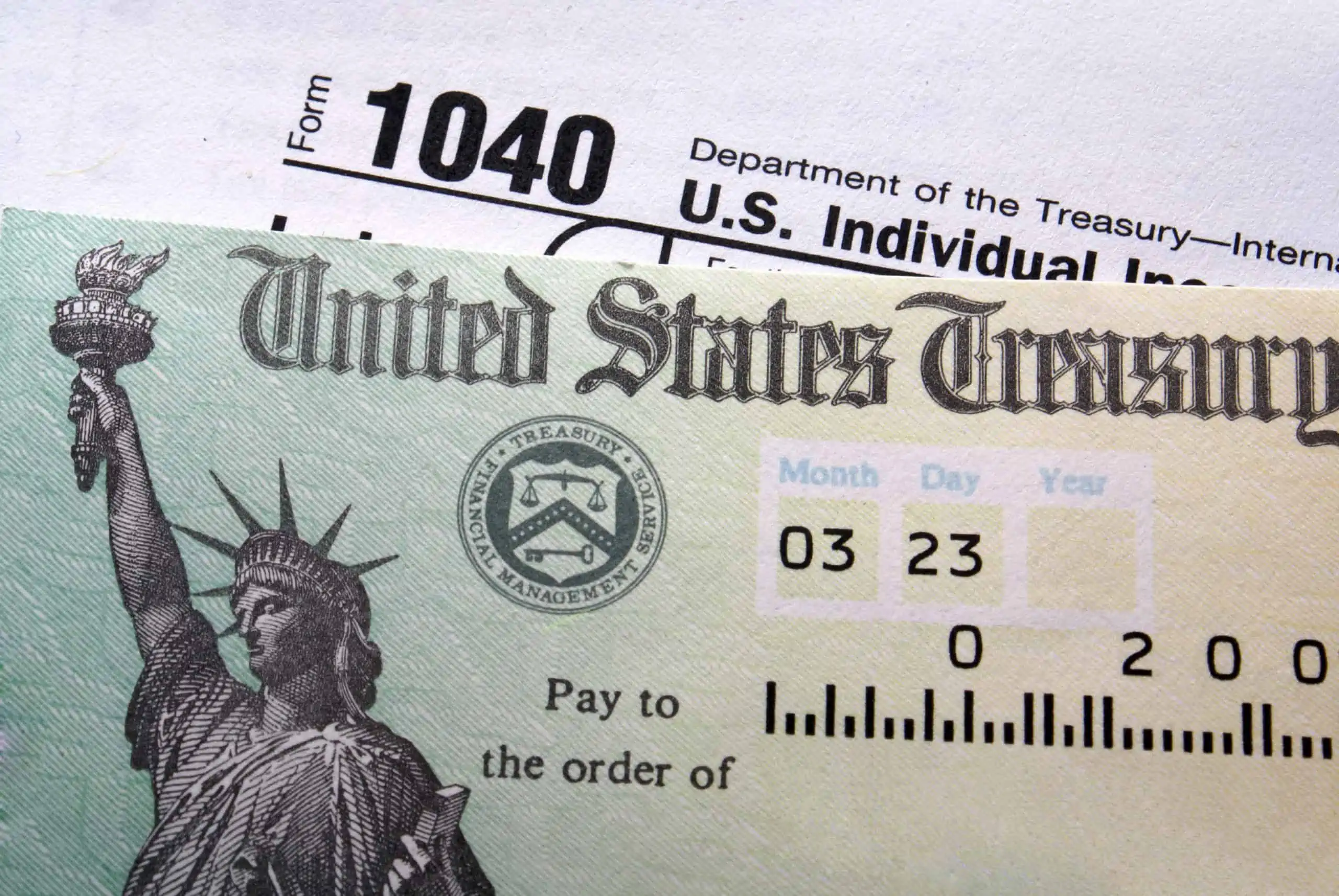Income Tax Return Basics To Know To Avoid Worry
This post may have affiliate links. Please read the Disclosure Policy for complete details.
“Income tax return”.
That phrase can send shivers down the spine of even the most fearless daredevil.
Maybe even more than thinking about going to the dentist ????
The reality is that filing an income tax return shouldn’t be very scary or intimidating for most people.
Then why is it, you ask?
Probably because people simply don’t understand much about the process of filing an income tax return or what it actually entails.
That’s what I would like to resolve with this article–I want you to understand the basic rules and requirements for filing an income tax return so you are less intimidated by taxes.
It’s really important for those of you who decide the DIY taxes route is how you want to proceed.
Since most people don’t have a complex income tax return, these are the most general rules applying to a wider audience.
If you have more complex tax situations, you should absolutely contact a qualified tax preparer.
So, starting at the very beginning…
WHO NEEDS TO FILE A TAX RETURN?

It may surprise some of you, but not everyone is required to file an income tax return.
If you have no tax liability, you don’t have to file a tax return.
If you are due a tax refund, you technically aren’t required to file an income tax return–although I would say that not doing so and leaving your money in the government’s hands is a bit questionable.
| If your filing status is: | If your age is: | If your income is: |
|---|---|---|
| Single | <65 | $12,200 |
| Single | >65 | $13,850 |
| Married Filing Jointly | <65 (both) | $24,400 |
| Married Filing Jointly | > 65 (one) | $25,700 |
| Married Filing Jointly | > 65 (both) | $27,000 |
| Married Filing Separately | Any Age | $5 |
| Head of Household | <65 | $18,350 |
| Head of Household | >65 | $20,000 |
| Qualifying Widow(er) | <65 | $24,400 |
| Qualifying Widow(er) | >65 | $25,700 |
Again, this is just a simple breakdown of the filing requirements based on age and gross income.
For a more comprehensive method of determining your filing requirement, or if you have more complex tax situations, you should contact a qualified tax professional.
FILING TAXES WITH NO INCOME
As you learned above, not everyone has to file an income tax return.
You may not make enough to be required to file a tax return but you should still do so.
Why?
As recently as 2018, you needed to file a tax return to qualify for subsidized health insurance under ObamaCare.
There’s no way to know if a program similar to that will come back, so you may need to do this in the future again.
You also needed to file a return to reconcile your Premium Tax Credits.
Additionally, you’ll need to file an income tax return with no income if you are interested in any of those prescription discounts that the manufacturers offer.
To get on the free or discounted prescription program, you need to verify your income each year and that is done by sending them a copy of your income tax return.
TAXABLE INCOME (WHAT GETS REPORTED ON THE INCOME TAX RETURN)
There is a reason the form is called an “income” tax return.
That reason is that you only have to report taxable income.
For most people, that includes:
- Wages
- Interest
- Dividends
- Investment/capital gains
- Pension payments (such as Roth IRA distributions)
- Business profits (including 1099-NEC income)
- Barter profits
- Gambling winnings
- Unemployment compensation
- Canceled consumer debt
It doesn’t matter if you receive a “tax form” or not, if you receive money it needs to be reported.
For example: if you earned $8 in interest from a high-yield savings account, you wouldn’t get a Form 1099-INT because the minimum reporting amount is $10, but you are still responsible for reporting that interest on your income tax return.
Something else that may be a bit confusing is canceled debt.
In many cases, if the debt on your primary residence is forgiven, you generally don’t report that amount as income.
Consumer debt is completely different–if you have credit card debt forgiven, that is reportable as taxable income because you’ve used that “loan” to make consumer purchases and you aren’t required to give up the items for the debt to be forgiven.
You may be wondering what isn’t considered reportable income.
That would be stuff like:
- Gifts
- Sales of personal items
- Reimbursements (ie: you pay the bar tab & everyone sends you their share)
- Cash rebates (ie: Rakuten cash-back or mail-in rebates)
If you and a bunch of friends decide to take a trip to the mountains and you make the payment for the cabin; the money you get back isn’t reportable at all on your income tax return.
One thing that some people might be confused about is the sale of personal items.
If you have items around the house that you want to get rid of that is considered nonreportable income for tax purposes.
When you go around to flea markets and garage sales looking for items to flip for a profit, that is business income and 100% reportable on your income tax return.
INCOME YOU DIDN’T PHYSICALLY RECEIVE
Most of the income you get comes in the way of physical payments to you.
Things like a payroll check or your social security deposit.
Those are easy for people to comprehend as “income” because they are actually seeing the money and able to spend it.
There are certain financial accounts where the money is required to be reported on your income tax return even though you don’t physically get anything.
One such example is a certificate of deposit where the interest gets credited to the account even though you may be locked into a 5-year term where you cannot get the interest unless you break the terms.
Another common instance is when your investments pay dividends (even if you have the dividends reinvested) or when you sell off investments for a capital gain.
You never physically withdrew the money from your brokerage account which is what confuses people.
It was paid to you, even though you left it in the brokerage so it’s technically considered income and reportable on your tax return.
TAX FILING DEADLINE

Generally speaking, your federal income tax return is due by April 15th of any given year.
If April 15th falls on a weekend, the tax filing due date gets pushed to the next business day.
That can mean a Tuesday in the case of the first Monday being Emancipation Day as everything is shut down in Washington DC.
So, every few years, you get 3 extra days when the April 15th deadline gets pushed to the following Tuesday, April 18th.
If you live abroad, spend significant time outside of the country, or will be out of the country come April 15th, you may have a different deadline depending on your specific situation–make sure to consult with a qualified tax professional to deal with that!
If you need some extra time to get your return filed, check out the next section.
TAX EXTENSIONS
You may not be able to file your income tax return by the April 15th tax filing deadline–or whatever the date happens to be for any given year.
Sometimes you are waiting for documents like Schedule K-1 from investments such as a Master Limited Partnership (MLP).
You could be a partner/shareholder in a company and wait for someone else’s tax professional to take care of the business tax filing.
Other times you have a business but you are simply not good at keeping the books so you need additional time to get that stuff current.
Or you may just have had life get in the way such as
- births
- deaths
- moving
- marriage
- divorce
- any other life event
If you need more time to file your tax return–for any reason at all–you have a simple option.
Grab yourself a Form 4868 and mail it to the IRS or use the IRS Free File system to request the extension.
Generally speaking, as long as you mail/file on or before the original tax filing deadline, you will get an automatic 6-month extension of time to file your tax return (usually until October 15th or whatever the next business day is if it falls on a weekend/holiday).
It doesn’t cost you a thing nor are there any qualifiers such as income limits, everyone is entitled to it!
EXTENSION TO FILE, NOT TO PAY

You’ll notice that in the previous few paragraphs, I have the phrase “file your tax return” bolded.
That’s because it’s a very important phrase.
You are only allowed an extension of time to file but not to pay.
Your payment of tax liabilities must be paid by April 15th to avoid late payment penalties and interest.
You can still pay your tax liabilities late, but you must be prepared to receive a bill from the IRS for those penalties and/or interest charges should you choose to do so.
STATE TAX EXTENSIONS
Not all states have income taxes, so this section might not apply to you.
If you do live in a state that has an income tax, however, you should pay attention.
Some states don’t require you to file a separate state tax extension if you filed a federal tax extension.
Some state tax extension requirements are based on whether you expect a refund or owe the state taxes.
You need to check with your specific state to find out what you are required to file specifically with the state if you need an extension of time to file state taxes.
Tax Refunds

One of my biggest pet peeves is when people call the money they get back from the IRS a “tax return”.
The form you file is a tax return.
The money you get back from an overpayment is called a tax refund.
I’m sorry but that just needs to be put out there.
Ok, I actually feel better now lol.
Getting back to the point, let’s talk a little about tax refunds.
Most tax refunds are issued in less than 21 calendar days but that’s not a guaranteed time frame.
Situations that can cause a delay in the processing of your tax refund include:
- Incomplete tax return filing
- Errors on the tax return
- Identity theft
- Claiming the Earned Income Tax Credit or Additional Child Tax Credit
- Injured spouse filing
- Returns that require additional time to review
With regards to the tax credits mentioned above, the IRS won’t process tax refunds on income tax returns claiming them until at least mid-February.
This delay is to ensure that the tax returns claiming those credits are indeed supposed to be getting them.
You can easily check the status of your tax refund using the Where’s My Refund? system:
- 24 hours after the return has been accepted when filed electronically or
- Approximately 4 weeks after you’ve mailed in a paper tax return
This is the only thing you should be doing, as calling the IRS will not make your refund get processed any quicker nor will you be able to get any different information.
In fact, all it will do is waste your time, so don’t even bother contacting the IRS regarding your tax refund unless you have passed:
- 21 days if you filed electronically or
- 6 weeks if you filed a paper tax return
As far as getting your tax refund money, you can get a direct deposit to any number of financial institutions or a paper check, with the direct deposit being the quicker option.
You can have the tax refund direct deposited into a variety of accounts including:
- Checking account
- Savings account
- Individual Retirement Account (IRA)
- Direct savings bond purchase (up to $5,000)
Additionally, you can have your tax refund split in a variety of combinations using IRS Form 8888, with up to 3 different accounts as well as having a portion of the refund issued on a paper check.
Some states will allow you to track your state tax refund as well.
You would have to look into your state’s website to see if that’s a possibility.
STATE TAX FILING
Most of the info we’ve covered pertains to federal income tax returns.
Many of you also will have to deal with state tax returns.
While it would be impossible to address each state’s income tax filing requirements and rules, I simply want you to be aware that you need to think about state tax returns as well.
If you want more information on a specific state, I have created a page with links to state income tax websites for each one that has a tax.
Wrapping Up
Filing your income tax return doesn’t have to be a source of confusion and stress.
It can actually be just as mundane as any daily chore.
You just have to be aware of the basic rules, procedures, and deadlines.
Take the time to understand each of the topics discussed above and you will be more prepared to file your income tax return.
Your Turn
What makes you the most anxious about filing your tax return? What part(s) confuse you the most? How do you overcome the anxiety & stress around taxes (if you have)?

